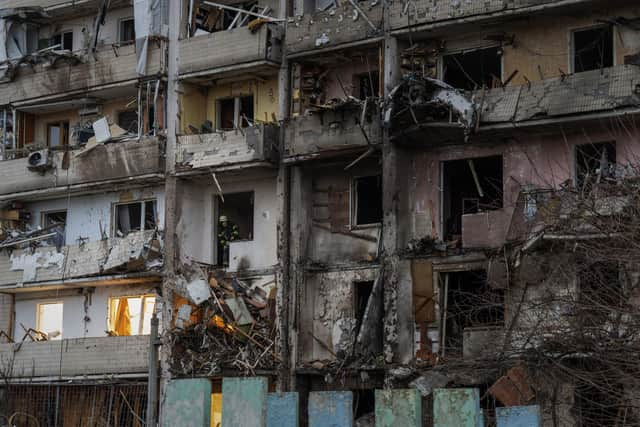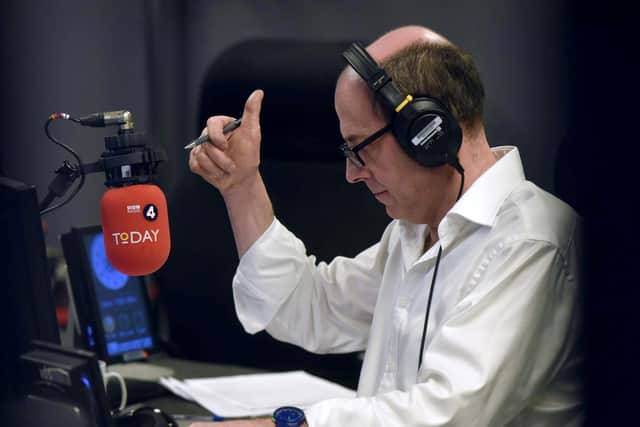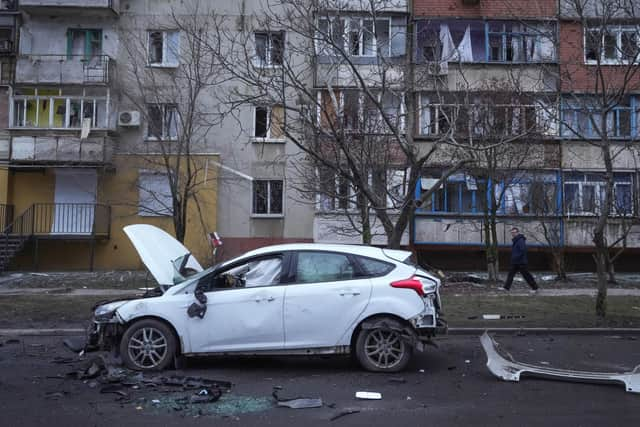Ukraine: How BBC’s Nick Robinson is lifting fog of war as foreign correspondents prove their value to the world – Jayne Dowle
For many of us – until the events in Ukraine – the marker in the sand was 9/11. When, in September 2001, the news broke that two hijacked planes had hit the Twin Towers in New York, I was in the Cafe Royal in London’s West End, planning a birthday party.
Advertisement
Hide AdAdvertisement
Hide AdIt seemed poignant to be in the same place where, one evening in 1941, during the Blitz, a 50kg high-explosive German bomb landed and killed at least 34 young people, leaving dozens more seriously injured.


Now, when I heard the news that war had broken out in Europe again, I was standing by the kettle in my kitchen in South Yorkshire, with the solemn voice of BBC Radio 4’s Today programme host, Nick Robinson, bringing tears to my eyes.
Reporting for Channel 4 News from the central Ukrainian city of Dnipro later that day, its international editor, Lindsey Hilsum, highlighted how ordinary citizens are using social media and picture-sharing apps to send information and graphic images out into the world.
Advertisement
Hide AdAdvertisement
Hide AdShe made a salient point; “citizen journalism” is a very powerful and potent force made possible by 21st century technology. And social media goes beyond all measures of influence; it costs nothing, only a device and wi-fi. However, the strength and weakness of both are that they are unfiltered.


Without journalists, sound crews, camera crews and photographers to make sense of it all, we are lost in the fog of war.
And let us not forget the judgement, instinct and skills of those who piece it all together from the safety of newspaper and digital news offices, television and radio studios back home.
No picture, and I hate to add the caveat ‘so far’, has had the same impact as that of Helena, a teacher, standing outside her apartment block, her head bandaged and bloodied.
Advertisement
Hide AdAdvertisement
Hide AdSomeone took it, and took a risk to do so. And someone chose it. And cropped it to fit the page and screen. And someone else wrote the caption and the headline and put the story together that included her name, forever immortalising “Helena” as one of the first victims of a terrible invasion we see and hear unfold before us.


Last Thursday, I had already woken up to television reports of tanks and shelling on Sky News and gone straight downstairs to make coffee. However, that disembodied voice coming out of Alexa, the careful pace and pauses for emphasis of an award-winning veteran broadcaster – Macclesfield-born Robinson is 58, starting his professional life at Piccadilly Radio in Manchester before working for the BBC and ITV – hit home.
I was, with an awful feeling of dread, reminded immediately of another BBC man, Richard Dimbleby, the first broadcaster to report from the liberation of Belsen concentration camp in April 1945. People say that media is disposable, tomorrow’s chip paper; much of it is, but what stands the test of time certainly isn’t.
The next morning, however, the former news editor in me wondered how Robinson was going to “take the story on”, as we used to say. You might think that in such a rapidly-moving situation – it was already breaking on Twitter that a Sky News crew had to run for their lives after coming under shelling attack – the story would tell itself.
Advertisement
Hide AdAdvertisement
Hide AdHowever, it is incumbent upon a journalist to make a story their “own”. And in this Robinson has clearly taken the wise decision to bring all his experience as a seasoned interlocutor of politicians to bear on talking out the experiences of ordinary people under fire.
On day two of the invasion, the producers gave him time – against a major interview with Defence Secretary Ben Wallace – to speak to a woman taking shelter underneath Kyiv’s Central Station. “It’s not a normal situation, it’s my country, my land, my city,” she said. “Have you taken food down with you, taken bedding with you?” he asked, touching on the very human questions most of us would want to ask in this horrific situation. And Wallace, to his credit, listened politely before responding sympathetically, recognising the importance of such exchanges.
The next time that someone complains that “the media are all to blame” (for whatever it is), I shall remind them of all of this. Of late, I had parked the resentment and frustration I felt at the start of the pandemic when people blamed journalists for causing panic.
However, I’m steeling myself again. And I’m ready to say that we should all be grateful that we have a free and democratic press. And, as the people under siege in Ukraine and in Russia, where media outlets are state-controlled and critical journalists face severe reprisals, know, it is far too easy to take it for granted.
Advertisement
Hide AdAdvertisement
Hide AdSupport The Yorkshire Post and become a subscriber today. Your subscription will help us to continue to bring quality news to the people of Yorkshire. In return, you’ll see fewer ads on site, get free access to our app, receive exclusive members-only offers and access to all premium content and columns. Click here to subscribe.
Comment Guidelines
National World encourages reader discussion on our stories. User feedback, insights and back-and-forth exchanges add a rich layer of context to reporting. Please review our Community Guidelines before commenting.